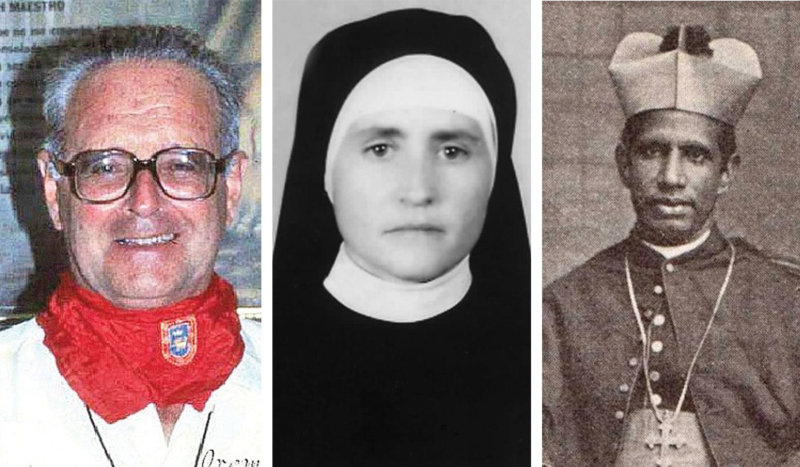
Alejandro Labaka Ugarte by Yalicsa Mazon / Wikimedia Commons (Left), Sister Inés Arango Velásquez by Sister Adela Paternina TC / Misyon Online (Center), Matthew Makil by Apostolisches Vikariat Ernakulam / Wikimedia Commons (Right)
Pope Leo XIV advanced the causes of sainthood for three Servants of God this week, formally recognizing their heroic virtue and designating them as “Venerable.”
The announcement came during a May 22 audience with Cardinal Marcello Semeraro, prefect of the Dicastery for the Causes of Saints, Vatican News reported.
Two of the newly recognized figures, Bishop Alessandro Labaka Ugarte and Sister Inés Arango Velásquez, were missionaries who died in 1987 while seeking to protect an Indigenous community in Ecuador’s Amazon region.
Originally from Spain, Bishop Labaka entered the Capuchin order in 1937 and later served in China before being expelled during the Communist regime. He continued his missionary work in Ecuador, where he became bishop in 1984 and worked closely with Indigenous groups, including the Tagaeri.
Sr. Inés, a member of the Capuchin Tertiary Sisters of the Holy Family, joined the mission in Ecuador in the late 1970s. Born in Medellín, Colombia, she had a background in education and pastoral ministry. Both she and Bishop Labaka were known for their advocacy on behalf of Indigenous peoples, particularly as commercial interests in the region escalated tensions.
On July 21, 1987, the two were flown into a remote area of the rainforest to initiate peaceful contact with the Tagaeri, a group known for avoiding outside interaction. The next day, their bodies were found, bearing signs of a violent death.
Their decision to approach the group, despite the known risks, was a clear expression of their commitment to their missionary calling.
The third new “Venerable,” Bishop Matthew Makil, played a pivotal role in shaping the pastoral and communal life of the Syro-Malabar Church in India during the late 19th and early 20th centuries.
Born in 1851 in the town of Manjoor to a well-off Christian family, he was ordained a priest in 1865 and began his ministry in parish settings. His leadership qualities led to his appointment as Vicar General of Kottayam in 1889.
Just three years later, he established the Sisters of the Visitation of the Blessed Virgin Mary, a congregation dedicated especially to the education of girls. His broader pastoral efforts included strengthening catechesis, supporting the poor, and fostering vocations to religious life.
Amid rising tensions between different Catholic communities in Kerala, Bishop Makil worked tirelessly to promote unity and understanding. His efforts ultimately led him to propose a peaceful solution: the creation of two separate vicariates.
Pope Pius X approved the plan in 1911, appointing him to lead the new Vicariate of Kottayam. He served there until his death in 1914, guided by his motto, “God is my hope.”

